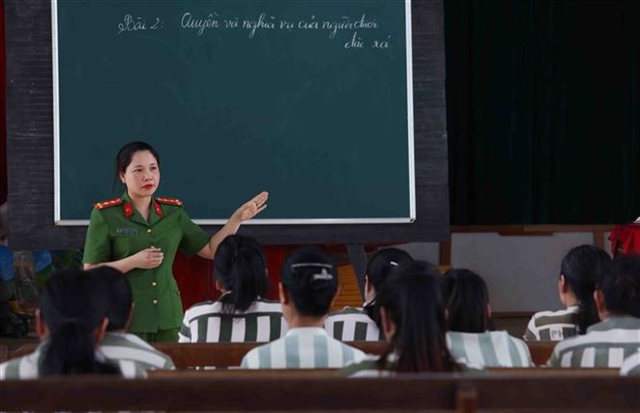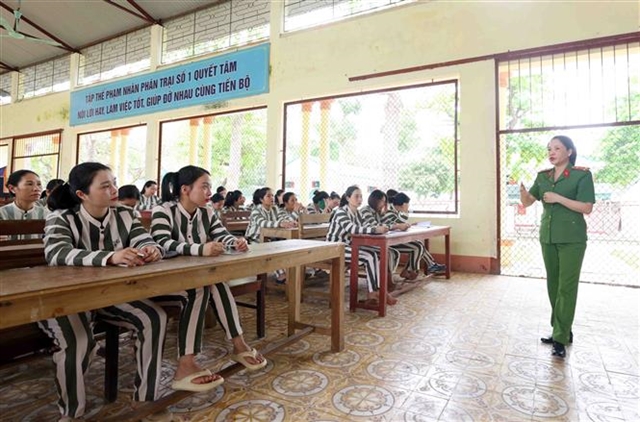 Society
Society

 |
| An officer at Prison No 6 in Nghệ An Province provides guidance and consultation on the humanitarian and clemency policies of the Party and State for convicted inmates. VNA/VNS Photos Phạm Kiên |
HÀ NỘI — Prisons and detention centres have completed the careful review and documentation of inmates eligible for presidential amnesty, part of a special clemency initiative marking the 50th anniversary of the Liberation of the South and National Reunification on April 30.
Amnesty is a humanitarian and compassionate policy of the Party and State, extended to inmates who have demonstrated good conduct and progress in their labour and rehabilitation during incarceration.
For those granted early release, it represents a fresh start – a second chance to make amends and rebuild their lives with dignity and hope.
“If the past is a string of mistakes, let it become experience. Rise after the fall with confidence and self-respect.”
These words are boldly displayed on a board in the education hall of Prison No 6 under the Ministry of Public Security, located in Nghệ An Province.
Every inmate has a story, a unique set of circumstances. These days, those whose names appear on the amnesty recommendation list count down the hours, longing for the moment they can return home, leaving behind a dark chapter and looking forward to a better future.
Among them is Nguyễn Văn Hữu N., who has served 28 months out of a 38-month sentence. Due to his commendable record of labour and rehabilitation, he has been proposed for this round of amnesty.
Once a primary school teacher, N. was encouraged by prison officers to join a literacy group, helping illiterate fellow inmates. Besides two to three formal classes per week, he also dedicates his evenings after labour duties to patiently tutor others in reading and writing.
As the day of potential release nears, N. shares his deepest wish: to reunite with his family, especially his two daughters – the source of his pride and motivation throughout his sentence.
“Despite my mistake, my wife has continued to care for our family with unwavering dedication. The girls have never let hardship or stigma affect their studies,” he said.
His voice quivered as he added, “My eldest just graduated with honours in banking and finance. The younger one is a top provincial student in high school.”
Tears well up as he spoke, holding on to the hope of going home, making amends and never again straying from the law.
 |
| Amnesty is a humanitarian and compassionate policy of the Party and State, bringing a second chance to make amends and rebuild their lives with dignity and hope. |
To support inmates preparing for reintegration, Senior Lieutenant Trần Anh Quế, head of the education, healthcare and environment unit at Prison No 6, explained that the facility organised training programmes in life skills, legal education and ethics for those under consideration for amnesty.
“The inmates have shown genuine engagement and a willingness to absorb these lessons. They recognise the value and meaning of what they’re learning,” he said.
The path to redemption is not easy, but for those granted amnesty, it marks not just a return to freedom but the beginning of a life renewed.
Return to family
This year’s amnesty criteria introduce notable changes compared to 2024. Previously, inmates were only eligible if they had served at least half of their sentence, with the remaining term not exceeding six years.
Under the updated policy, eligibility has been expanded. Inmates now qualify after serving just one-third of their sentence, provided the remainder does not exceed eight years.
In special cases such as juvenile offenders, inmates aged 70 or older, those with serious illnesses, or individuals recognised for their contributions to the revolution, the threshold is lower. These individuals may be considered for amnesty after completing just one-quarter of their sentence.
However, the most critical requirement remains unchanged: the inmate must consistently receive performance ratings of good or higher during their rehabilitation.
Lê Thị T., born in 1984 in Thanh Hóa Province, was sentenced to 90 months in prison for fraud and appropriation of assets. Having served more than 30 months, she couldn’t hide her overwhelming emotion upon learning she was recommended for amnesty.
She said: “It feels like a dream. I’ve only completed a third of my sentence. I never imagined I’d be returning home so soon. This joy came with the expanded eligibility criteria.”
Though amnesty reflects the State’s spirit of clemency, T. emphasised that inmates must still take personal responsibility from day one: strictly follow prison rules, serve their sentences in earnest, show remorse, work to repair the damage caused and engage actively in rehabilitation efforts in order to benefit from this policy.
According to Senior Lieutenant Nguyễn Tiến Dũng, Deputy Superintendent of Prison No 6 under the Ministry of Public Security, inmates are informed early on about pathways to clemency.
He said: “From the moment they enter, we educate them on prison regulations and the importance of compliance for consideration for amnesty, sentence reductions or early release. Each month and quarter, their rehabilitation is evaluated and rated.”
When an amnesty is announced, the prison publicly reviews each eligible case. Inmates who meet the requirements are invited to submit written requests, and selection is carried out through a confidential voting process within the prisoner groups to ensure fairness.
“We make sure no qualified case is overlooked,” Dũng added.
At this point, the prison has completed its review and finalised the list and dossiers of eligible inmates for submission in this commemorative round of amnesty.
In preparation for reintegration, the prison has launched community reentry classes and legal counselling sessions. These focus on helping inmates understand their legal responsibilities and the rules of reintegration while awaiting final approval from the Central Amnesty Advisory Council.
The facility has also coordinated with the provincial police to issue ID cards for the soon-to-be-released inmates. — VNS




